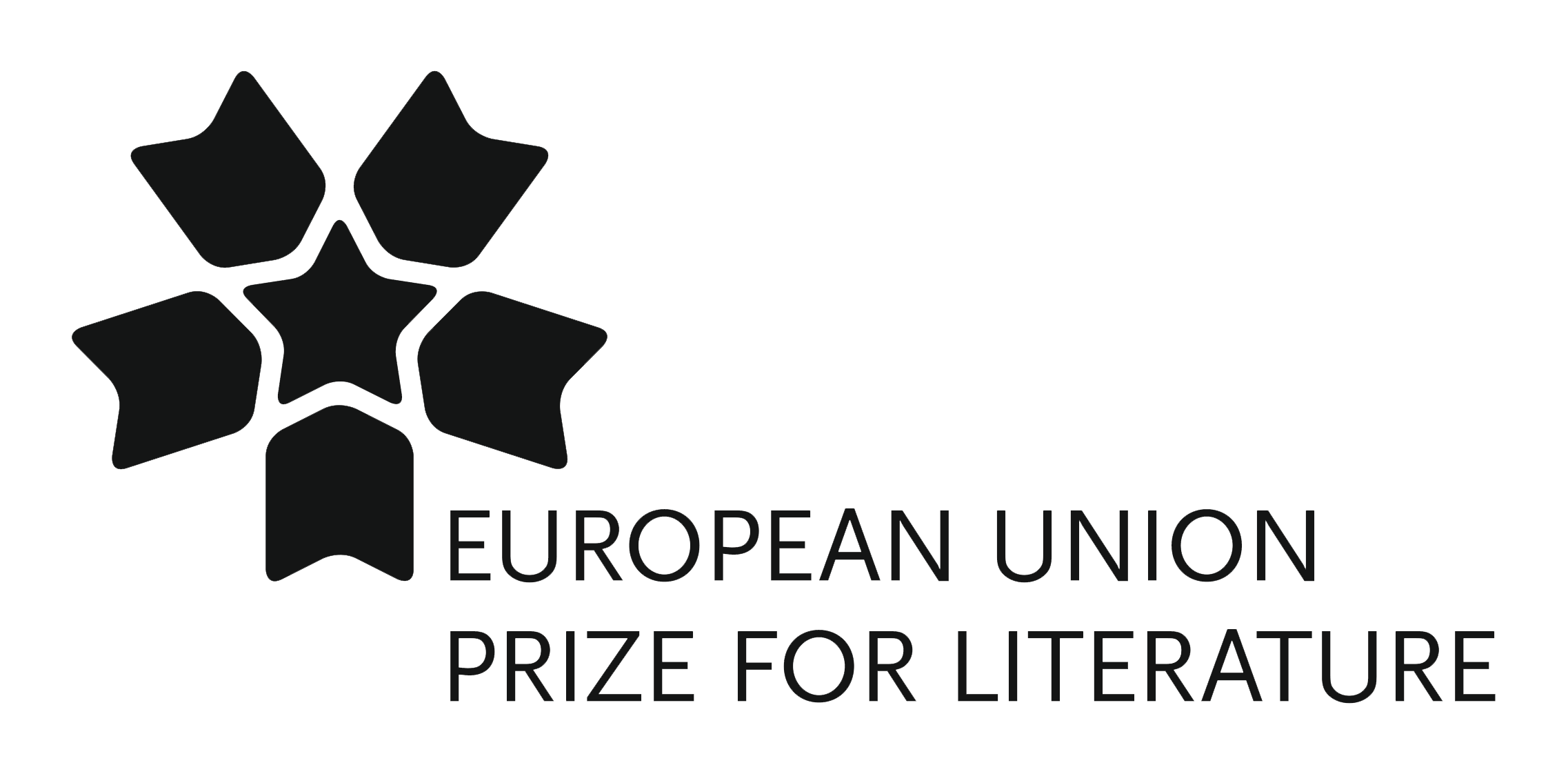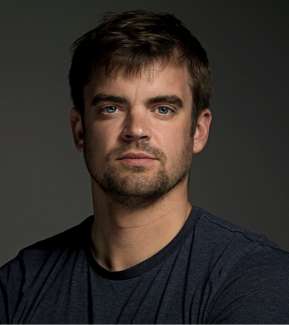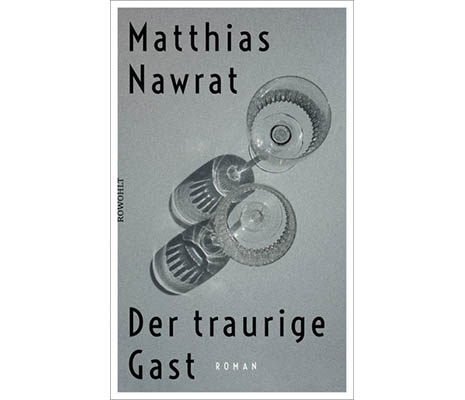Matthias Nawrat was born in 1979 in Opole, Poland, and moved to Germany with his family at the age of 10. His first novel Wir zwei allein (The Two of Us Alone), published in 2012, was awarded the Literaturpreis of the Kanton of Bern 2012 and the Adelbert-von-ChamissoFörderpreis 2013. For an excerpt from his dystopian novel Unternehmer (Entrepreneurs), Nawrat was awarded the KELAG Prize at the Klagenfurt Days of German-Language Literature in 2012 and the Bayern2-Wortspiele-Preis 2014. In his subsequent novel Die vielen Tode unseres Opa Jurek (The Many Deaths of our Grandpa Jurek), which was awarded the Förderpreis of the Bremer Literaturpreis 2016 and the Alfred-Döblin-Medaille 2016, Nawrat countered the historical horror of his family history with the cheerfulness of a picaresque novel. Nawrat’s new novel, Der traurige Gast (The Sad Guest), was published in 2019 and is a quiet, melancolic book that traces the most diverse biographies in contemporary Berlin. Nawrat has also published essays, short stories and a journal about a journey to Siberia: Nowosibirsk: Tagebuch (2017). He lives in Berlin.
Agent / Rights Director
Publishing House
Translation Deals
- Albania: Albas
- Bulgaria: Colibri
- Italian: L’orma Editore
- Macedonia: Tri
- Serbia: Treci
Excerpt
Der traurige Gast - Matthias Nawrat - Language: German
Diaspora
Am dritten Sonntag im Januar fuhr ich von unserem Viertel aus mit der U-Bahn zur Hasenheide am Südstern, auf die andere Seite der Stadt. Dort gab es eine Kirche, in der sich die polnische Gemeinde traf. Ich war nur einmal im Inneren der Kirche gewesen, und auch nicht zur Messe, sondern um mir die farbigen Fensterbilder der Heiligen anzuschauen. Genau gegenüber der Kirche befand sich das Lokal Mały Książe, Der kleine Prinz, und wenn man zur richtigen Zeit eintraf, dann bekam man noch einen Tisch, bevor das Restaurant, an das ein Laden mit Lebensmitteln angeschlossen war, sich mit Familien und älteren Herren und Damen füllte, die aus der Sonntagsmesse kamen. In dem Restaurant wurde Polnisch gesprochen, aber jeder Gast sprach auch Deutsch, und die zwei jungen Bedienungen sprachen beides ohne Akzent, sie waren, so glaubte ich, die Töchter des Lokalbesitzerehepaars, die an Sonntagen aushalfen.
Als ich den Raum betrat, waren alle Tische noch frei, aber kurz nach elf begann der Raum sich zu füllen. Es setzte sich, weil die Leute bald zwischen den Essenden standen und ihnen, um abzuschätzen, wann ein Platz für sie frei werden würde, auf die Teller schauten, ein älterer Herr zu mir. Er war in einen grauen Anzug mit weißem Hemd und goldgelber Krawatte gekleidet und trug am kleinen Finger einen goldenen Siegelring, dessen Wappen einen Schild und zwei gekreuzte Degen zeigte. Wir mussten beide nah an den Tisch rücken und uns vorbeugen, hinter uns drückten die Leute gegen unsere Rücken, im Raum dröhnte es wie in einer Abflughalle.
Er fragte mich, ob ich die Pierogi, die ich gerade zu essen begonnen hatte, empfehlen könne, und ich sagte, dass es zwar nicht die besten seien, die ich je in meinem Leben und vielleicht auch nicht die besten, die ich je in dieser Stadt gegessen hätte, aber dass sie trotzdem gut seien. Und so bestellte er bei einer der zwei jungen Frauen, die sich durch die Menge zu uns vorgearbeitet hatte, eine Portion Pierogi.
Wir sprachen Polnisch miteinander. Es stellte sich heraus, dass er aus Südpolen stammte, aus einer Stadt in der Nähe der Stadt Opole, aus der meine Familie kam und in der ich geboren worden war und die ersten zehn Jahre meiner Kindheit verbracht hatte.
Dann waren Sie gerade auch in der Kirche?, fragte er.
Nein, ich war nicht in der Kirche, sagte ich.
Ist denn etwas passiert?
Nein, ich gehe einfach nur nicht in die Kirche, sagte ich.
Er warf mir einen besorgten Blick zu. Für einen Augenblick fühlte ich mich wie ein Betrüger, der hierhergekommen war, um von der gereinigten Stimmung und der Erhabenheit der Kirchgänger um uns herum zu profitieren.
Er fragte mich, was ich beruflich machte, und ich sagte, dass ich Schriftsteller sei.
In welcher Sprache schreiben Sie?
Auf Deutsch.
Und worüber?
Ich schreibe Erzählungen über verschiedene Dinge, zuletzt über meine Familie und Leute, die ich kenne, sagte ich. Ich habe drei Erzählbände veröffentlicht.
Ach so, sagte er.
Er sagte, dass er Handwerker sei und schon seit über fünfzig Jahren in der Stadt lebe. Er sei in den 60er Jahren zur Zeit der Proteste geflohen und habe hier seine Frau kennengelernt, die aus Lublin gewesen und vor sieben Jahren verstorben sei. Nun lebe er allein, ein paar Straßen weiter.
Was für eine Art Handwerker sind Sie?, fragte ich.
Klavierstimmer, sagte er. Er höre aber inzwischen schlecht, andernfalls könnte er sich noch heute, mit 81 Jahren, etwas dazuverdienen, da in den reicheren Stadtteilen Berlins viele ein Klavier zu Hause stehen hätten. Er habe auch ein Haus in seinem Heimatort, aber er kenne dort niemanden mehr. Sein Sohn und seine Tochter machten dort manchmal Urlaub mit ihren Familien.
Seine Pierogi waren gekommen, und er war eine Weile mit dem Essen beschäftigt. Ich fragte ihn, wie sie ihm schmeckten, und er sagte, dass er schon mal bessere gegessen habe, aber auch schon mal schlechtere.
Ach, schauen Sie, sagte er dann, Richtung Theke deutend, an der die Leute vor der Kasse in der Schlange standen, um die Lebensmittel aus dem Laden zu bezahlen. Da ist Frau Halina.
Vom Eingangsbereich des Restaurants winkte ihm eine Dame in einem roten Mantel zu, mit goldenen Ohrklipsen und gepudertem Gesicht und rot geschminkten Lippen. Sie kam in kleinen Schritten und sich umsichtig an den Stuhllehnen festhaltend zwischen den Rücken der Väter, Mütter und Kinder auf uns zu.
Guten Tag, Herr Rosowski, rief sie, lauter, als nötig gewesen wäre, direkt in sein Ohr. Sie lächelte mir freundlich zu, aber auch misstrauisch, als könnte ich ein Enkel ihres Bekannten sein, von dessen Existenz bisher keiner gewusst hatte. Die zwei anderen Stühle an unserem Tisch waren besetzt, es saß dort ein junges Paar, das sich, die Köpfe zusammensteckend, leise unterhielt. Ich stand auf und bot Frau Halina meinen Stuhl an, was sie aber ausschlug.
Bitte, sagte ich.
Ich war mit meinem Essen längst fertig, und die Geräuschkulisse im Lokal und die Leute, die noch immer standen und auf freie Plätze warteten, hatten mich erschöpft. Ich verabschiedete mich von Herrn Rosowski, der mich aber schon gar nicht mehr beachtete. Er war aufgestanden, half Frau Halina, sich zu setzen, und hängte ihren Mantel über meine Stuhllehne.
Ich habe mir eine Portion Pierogi bestellt, rief er ihr ins Ohr, während ich noch neben ihnen stand.
Ach schön, rief sie zurück und rückte den Stuhl näher an den Tisch heran.
Ich zahlte vorne an der Kasse, bei derjenigen der zwei jungen Frauen, von der ich glaubte, dass sie Małgorzata hieß, und trat in die kühle Winterluft hinaus, für einen Moment geblendet von dem grellen Himmel, der sich über die Kirche und den Friedhof auf der anderen Straßenseite und über die ganze Stadt spannte. Ich brauchte einen Moment, bis ich wieder wusste, wo ich war, und ging dann los, Richtung U-Bahn-Station.
Um mich waren spazierende Familien unterwegs. An der Kreuzung hielt ein Mann auf einem Fahrrad, hinter ihm zwei Kinder mit Helmen auf kleineren Fahrrädern. Die ganze Stadt schien unterwegs zu sein, obwohl die Luft schneidend kalt war. Ich ging an der U-Bahn-Station vorbei und an den Geschäften der Urbanstraße entlang zum Kanal, ich ließ mich von der Stimmung der Leute treiben. Ich hatte wirklich das Gefühl, dass ich in der Kirche gewesen war, wie als Kind in der Familiensiedlung am Stadtrand von Opole, als ich die Geschichten über die Wunder, über die Hochzeit zu Kana, über die Königreiche der Engel und der Teufel noch geglaubt hatte.
Excerpt - Translation
Translated from German by Katy Derbyshire
On the third Sunday in January, I took the U-Bahn from our neighbourhood to the Hasenheide area at Sudstern station, on the other side of Berlin. There was a church there where the Polish community met up. I had only been inside the church once, not for Mass but to look at the stained-glass saints. Directly opposite the church was the restaurant Mały Książe, The Little Prince, and if you arrived at the right time you could get a table before the place filled up with families and elderly ladies and gentlemen leaving Sunday Mass. The language in the restaurant, which had its own grocery shop, was Polish, but every guest also spoke German and the two young waitresses spoke without accents; they were the daughters of the restaurant owners, I believe, and helped out on Sundays.
All the tables were free when I arrived, but it began to fill up shortly after eleven. People were soon standing between the diners, staring down at their plates to judge when they’d be vacating their places, so an elderly gentleman joined me at my table. He was dressed in a grey suit with a white shirt and a golden-yellow tie and wore a golden signet ring on his little finger, its crest a shield and two crossed swords. Both of us had to pull our seats up close to the table and lean in, the people behind us pressing against our backs, the room reverberating like a departure lounge.
He asked me whether I would recommend the pierogi I had just begun eating, and I said they weren’t the best I’d ever eaten in my life and perhaps not the best I’d ever eaten in the city either, but they were still good. And so, once one of the two young waitresses had worked her way through the crowd to us, he ordered a portion of pierogi.
We spoke Polish to one another. It turned out he originated from southern Poland, from a town near Opole, the city my family came from, where I had been born and spent the first ten years of my childhood.
You’ve just come from church then, too? he asked.
No, I wasn’t at church, I said.
Has something happened?
No, I just don’t go to church, I said.
He cast me a concerned glance. For a moment, I felt like a con-man who had come here to profit from the church-goers’ feelings of purification and transcendence.
He asked me what I did for a living, and I said I was a writer.
What language do you write in?
German.
And what about?
I write stories about various things, most recently about my family and people I know, I said. I’ve published three short-story collections.
I see, he said.
He told me he was a tradesman and had been living in the city for more than fifty years. He had escaped during the protests in the 60s and had met his wife here, who was from Lublin and had died seven years ago. Now he lived alone, a few streets away.
What kind of tradesman are you? I asked.
A piano tuner, he said. But his hearing was bad now, he told me, otherwise he might still be making a little on the side, at the age of 81, since many people in the richer parts of Berlin had a piano at home. He had a house in his hometown as well but he didn’t know anyone there these days. His son and daughter took their families there on holiday.
His pierogi had arrived and he was occupied with eating for a while. I asked him how he liked them, and he said he’d had better but he’d had worse as well.
Oh look, he said then, pointing towards the counter where people were queuing up to pay for food from the shop. There’s Mrs Halina.
From the restaurant’s entrance area, a lady in a red coat waved at him, with golden ear clips, a powdered face and red-painted lips. She came over to us, taking tiny steps and holding on to the backs of the chairs between the fathers, mothers and children.
Hello, Mr Rosowski, she crowed directly into his ear, louder than necessary. She gave me a smile that was friendly but also dis-trusting, as though I might be a grandson no one had previously been aware of. The two other seats at our table were taken by a young couple talking quietly, their heads pulled in close. I stood up and offered Mrs Halina my chair, but she declined.
Please, go ahead, I said.
I had long since finished my meal and was exhausted by the volume in the restaurant and the people still standing around waiting for tables. I said goodbye to Mr Rosowski but he took no more notice of me. He had got to his feet to help Mrs Halina sit down and was draping her coat over the back of my chair.
I ordered a portion of pierogi, he yelled in her ear as I was still standing alongside them.
Lovely, she shouted back, and pulled her chair in closer to the table.
I paid at the cash desk at the front, thanked the young waitress I believed was called Małgorzata, and stepped out into the chilly winter air, dazzled for a moment by the bright sky arching above the church and cemetery on the other side of the street and above the whole of the city. It took me an instant to remember where I was, and then I set off back towards the station.
Families were out strolling around me. At the crossroads, a man on a bicycle stopped, behind him two children with helmets on smaller bikes. The whole of the city seemed to be out and about, though the air was bitterly cold. I walked past the under-ground station and along the shops on Urbanstrasse to the canal, letting the atmosphere drive me on. I really did feel like I’d been to church, like as a child on my family’s housing estate on the edge of Opole, back when I’d still believed the stories about the miracles, the marriage at Cana, the kingdoms of angels and devils.


